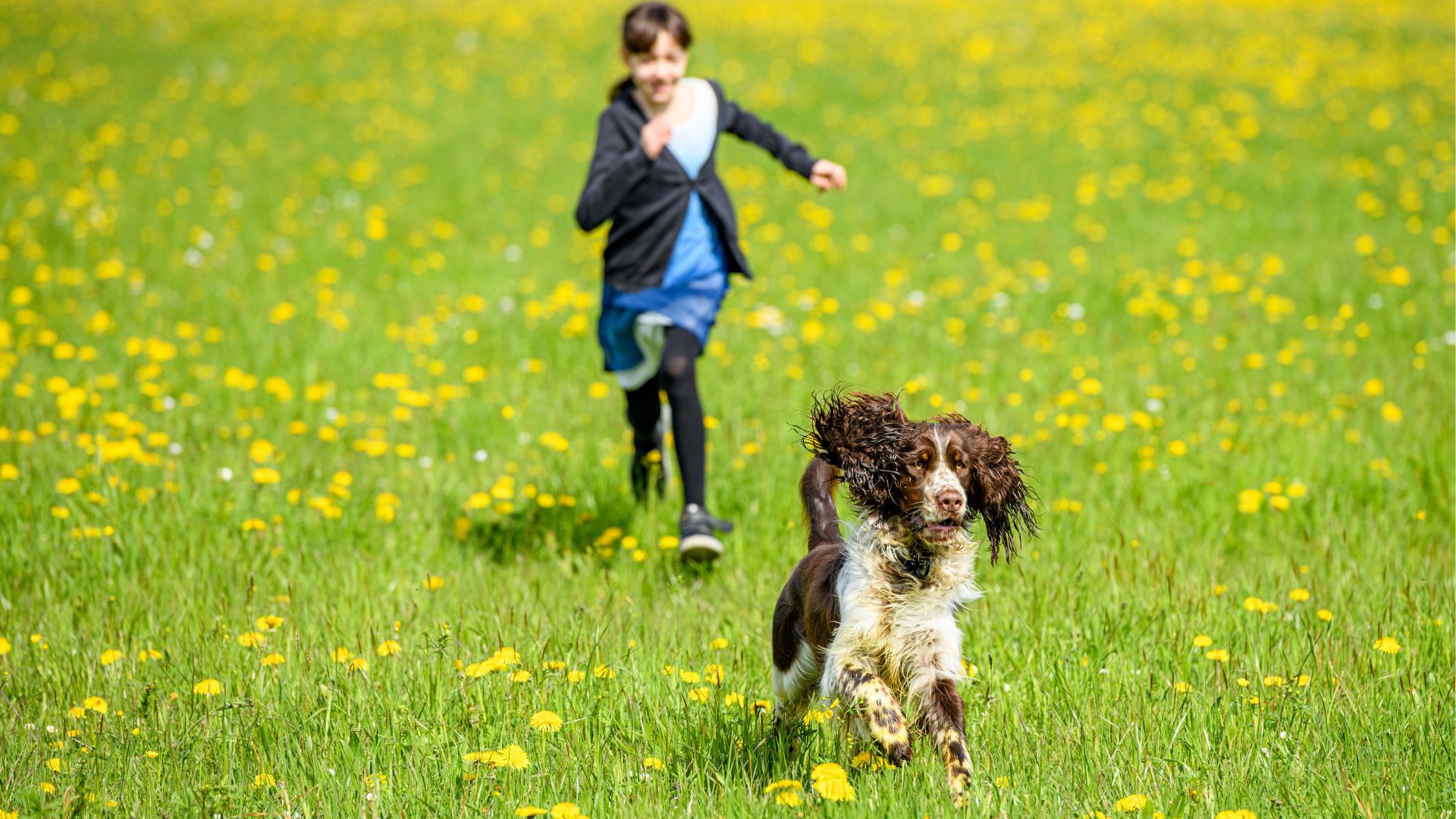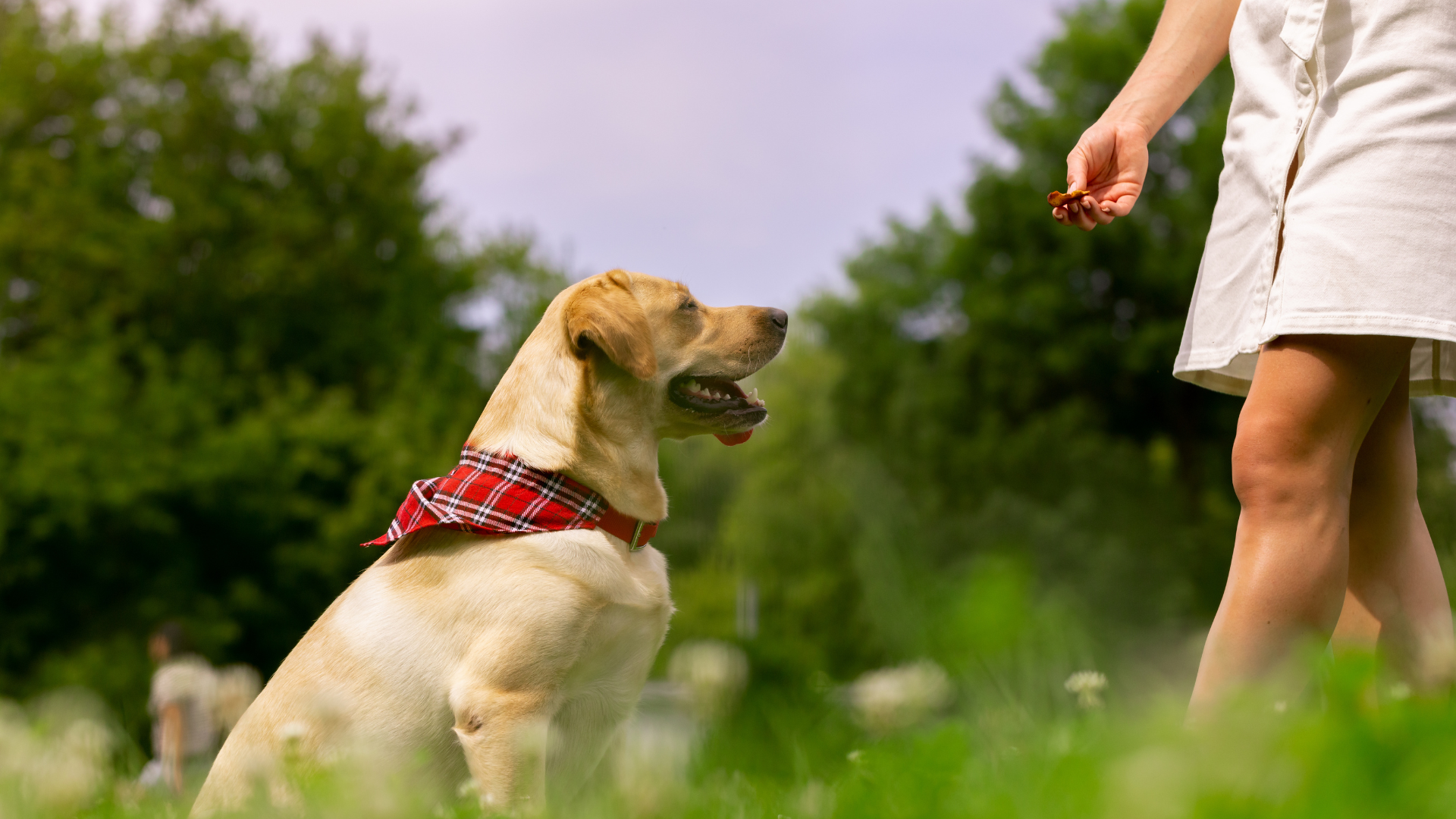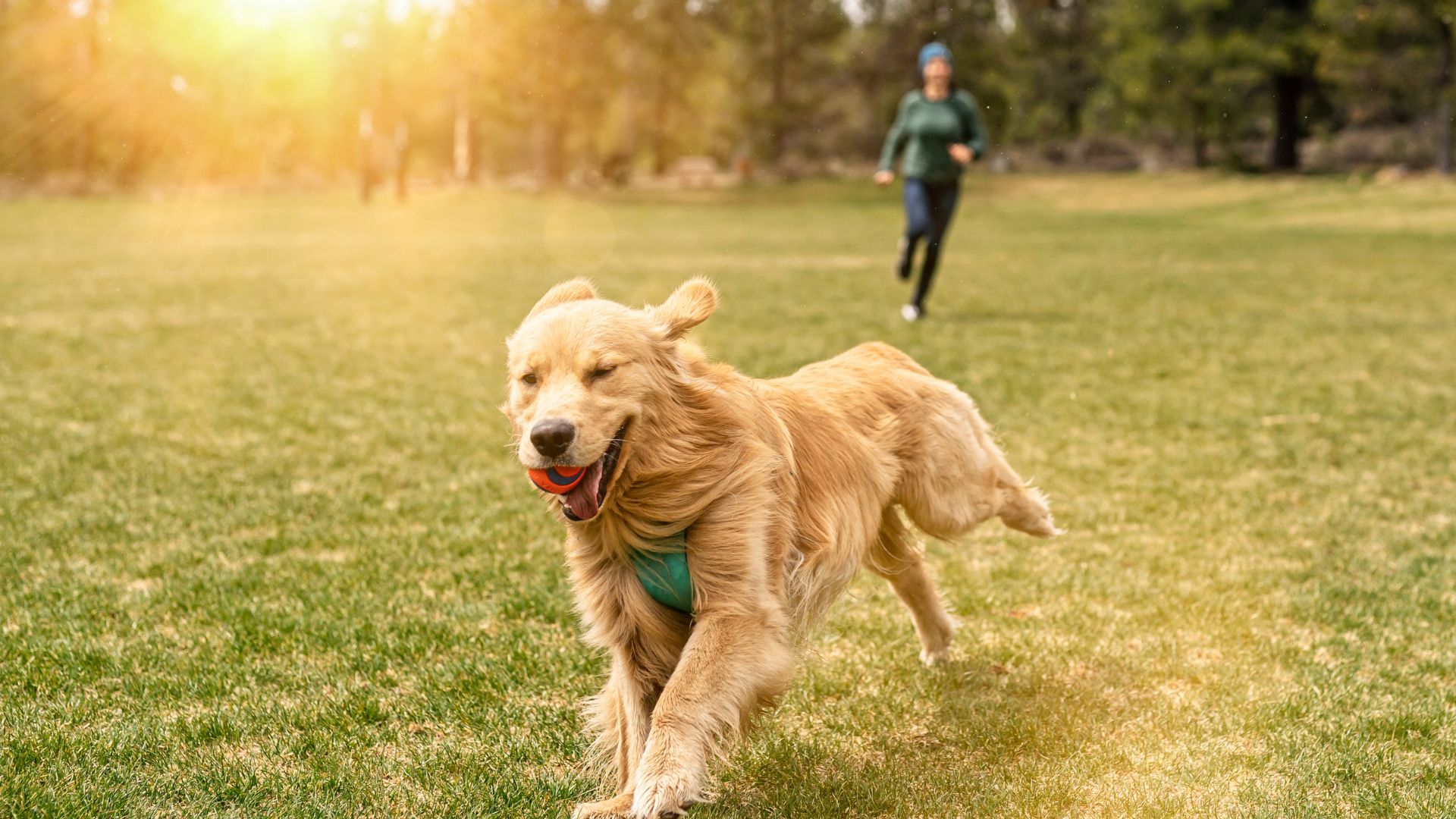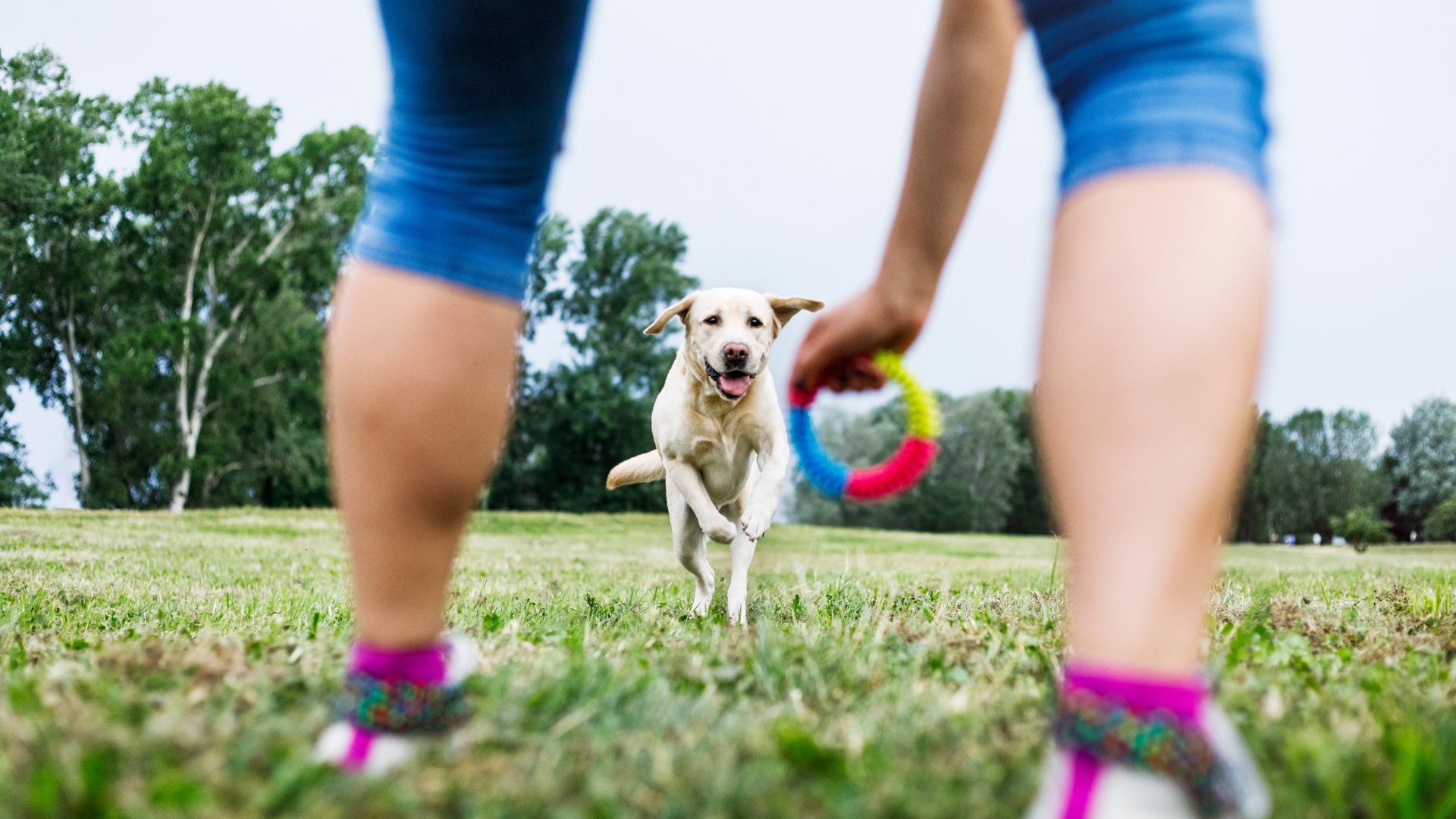
As a certified canine behaviorist, one of the top questions I get asked is, ‘How do I stop my dog running off?’ For most pet parents, our dream is to enjoy relaxed and fun off-leash walks with our dogs. But for so many of us, dog walks can easily become something stressful that you either hate doing or try to avoid.
While the best pet trackers can help you locate your dog should they escape or run-off, they don’t improve your dog’s training skills or the level of connection you have with your canine companion in the outside world.
There’s so many reasons why your dog might find it hard to pay attention to you when off the leash - from age, lack of training, the distractions in the environment, breed traits, and - most importantly - the relationship between your dog and you. Let’s dive into some of these challenges and how you can help to get your off-leash walks back on track!
How do I stop my dog running off?
If your dog is likely to run off when you let them off the leash - or perhaps you’re worried they might escape when your front door is open - then it’s important to address these concerns soon. A combination of some simple management alongside training for the future, will guarantee you can keep your dog safe.
1. Use a long training line
A long-line is a great tool to allow your dog some element of freedom while keeping them attached to you. A biothane line is a great option that won’t get wet or heavy if it rains. This line is effectively a longer version of your usual leash, that allows your dog five to 20 yards to move around without being able to run off. This isn’t necessarily a tool you’ll use for life - but a short term safety measure while you put some training into practice.
2. Home rules
Make sure all family members know to keep front doors or gates into your yard securely fastened when your dog is roaming. You can also get safety barriers - such as Dog G8 - to allow your doors to stay open and your dog safely trapped behind.
3. Start simple with training
A simple game of just saying your dog’s name and tossing a treat for them to sniff out on the floor is a great way to start building up a bit of connection with your dog. Training doesn’t have to be complicated!

4. Do you need a new recall cue?
If you’ve been using a cue - for example ‘here’ - with your dog for some time and they’re ignoring it, then it might be time to start from scratch. Combine a brand new cue - perhaps ‘come on’ - along with the best dog treats to build up a new history of it being rewarding to come back to you.
When using this new cue, make sure you start at home first - where your dog can concentrate - and make it super fun to run around after you, getting lots of treats or playtime, every time they hear the new cue.
5. Choose your environment
If you’ve got a dog who finds the world quite overwhelming, taking them off leash in a noisy city park could end up in them running off if they hear a loud noise.
If you’ve got a dog who just LOVES other dogs and can’t focus on you when their friends are around, then don’t start your recall training in the middle of a dog park. It’s important to match the environment to your dog’s personality style and how well you think they’ll be able to focus.
6. Avoid punishment
If your dog is running off already, shouting at them or punishing them in another way when they return will only further tarnish your connection. The negative impact of aversive methods in dog training have been shown to increase stress behaviors and make a dog less optimistic about life.
7. Be rewarding
When teaching your dog their new recall cue or just building up on your outside connection with your dog, be rewarding. Think about what your dog loves most. Is it a favored piece of food - maybe some cooked turkey? - or playing with you and their favorite toy?
Do they love to be stroked or actually, is touch a little uncomfortable for them? Focus on making the moment they return to you, when off the leash, the most fun part of their day and you’ll have a dog who doesn’t want to disappear on you!
Why does my dog run off?
Understanding why your dog has run off in the past is the key to improving your recall and ensuring walks aren’t stressful in the future. Let’s look into some of the reasons why your dog may not want to stay by your side.
1. They haven’t been taught a reliable recall
If your dog doesn’t understand that it’s rewarding to come back to you when asked, then the freedom that off leash time provides might prove too distracting and the minute they’re let off - they’re going to have their own kind of fun.
2. They haven’t been taught a reliable recall
If your dog doesn’t understand that it’s rewarding to come back to you when asked, then the freedom that off leash time provides might prove too distracting and the minute they’re let off - they’re going to have their own kind of fun.
3. The environment is wrong for them
The environment you’re walking in might be too distracting, exciting, or worrying for your dog. Stressed dogs can’t learn and will find it hard to engage in any rewarding activities you might provide for successful recall.
4. They’re bored
If you’re wondering, ‘do dogs get bored?’ then look at whether or not you’re being engaging with your dog when out on walks. Do you see your dog walk as something on the to-do list - a chore that needs completing? Are you emotionally present with your dog or are you busy on your phone checking your emails?
Connecting with your dog throughout your walk, not just when you want them to come back to you, is very important when wanting to have a good recall.

5. They’ve been punished in the past
If you’ve told your dog off for running off in the past or when they’ve been busy playing with pals when you wanted to go home, then they might start to avoid the leash being put back on.
6. Breed traits
Look at what your dog was bred to do - are they a hunter or a retriever? Did they get bred to chase small animals or follow a scent? What they were bred for is often a big clue as to what will be the distraction they can’t possibly ignore.
7. Age
Throughout our dogs' lives, they go through many stages of development. A puppy might be going through fear phases or just not understand what recall is all about.
An adolescent might be going through a hormonal surge or a secondary fear phase. A young adult dog might have just discovered what it’s breed desires are.
A senior dog might be losing their hearing or sight - or perhaps you’ve just slacked on rewarding recall as they’ve got older.
8. Breed traits
Look at what your dog was bred to do - are they a hunter or a retriever? Did they get bred to chase small animals or follow a scent? What they were bred for is often a big clue as to what will be the distraction they can’t possibly ignore.
What to do if your dog has run off
If you’ve just let your dog off-leash and they run off a short distance from you, then try to avoid your natural instinct to run straight after them. This can end up with a dog either feeling it’s under pressure or that, in fact, this is now just a fun game of chase.
The best thing you can do is to remain calm, try calling them to you and if that fails, make some other attention grabbing noises like clicking your tongue or making a ‘kissy’ noise. Change how your body looks - get low and open your arms wide or even try running in the opposite direction away from your dog.
If they’re still not responding, panic might start to kick in - so remember to breathe as calmly as possible. Throw treats or their favorite toy towards them but not to exactly where they are - you’re trying to encourage forward movement towards you. Look down at the ground in front of you and exclaim excitedly “what have I got” and start placing treats one by one on that spot.

If you can see other people around and you know your dog is likely to make a bee-line for other people or dogs, call out and request help in rounding up your dog.
If you’re worried you might have lost your dog, call someone to come and stay where your dog was last seen. Round up local friends or family members to come and search with you - avoiding scaring the dog who has gone missing.
You should also:
- Set up food stations to entice your dog towards you
- Share your location and direction the dog disappeared in on local dog parent Facebook groups
- Call the local vets and dog warden to inform them
- Check if there are missing dog volunteers in your area who could help you search
- Remember not to panic, most dogs return back to the area they last saw you pretty quickly.
If you’re finding off-leash walks stressful, read three reasons why your dogs recall isn’t reliable for more insight. And if you’re interested in understanding high prey drive in dogs we have some top ways to manage it.







